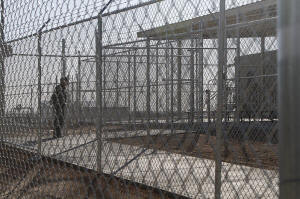Judge extends court-monitoring agreement for children in Customs and
Border Protection custody
 Send a link to a friend
Send a link to a friend
 [January 31, 2025]
By VALERIE GONZALEZ [January 31, 2025]
By VALERIE GONZALEZ
McAllen, Texas (AP) — A federal judge extended a court agreement on
Thursday ensuring safe and sanitary conditions for migrant children in
federal custody a day after U.S. Customs and Border Protection was set
to begin self-monitoring.
The agreement originally ended Wednesday, but District Judge Dolly M.
Gee in California decided to extend it by 18 months.
“CBP is not yet capable of wholly fulfilling its responsibilities under
the 2022 Settlement and the FSA (Flores Settlement Agreement) without
the additional support provided by the JCM (Juvenile Care Monitor) and
the Court,” the judge wrote in her order.
Customs and Border Protection did not immediately respond to a request
for comment.
A court-appointed monitor will continue to visit and report on
conditions for children in custody at U.S. Customs and Border Protection
facilities in the Rio Grande Valley and El Paso, Texas.

Concerns were initially raised during the first Trump administration
when reports surfaced of children separated from family for weeks and
held in poor sanitary conditions. In 2019, a Guatemalan teenager died in
custody as a result of a flu outbreak and a lack of proper medical care
in a federal facility in Weslaco, Texas.
The parties reached an agreement that was implemented in July 2022 for
two and a half years. It allowed a court monitor to keep track of
progress made by Customs and Border Protection. In the last report filed
in December, the monitor noted positive changes while also mentioning a
continued practice of separating some parents from their children during
their time in custody.
[to top of second column]
|

A Border Patrol agent wait to show reporters an immigration holding
facility, Tuesday, Feb. 25, 2020, in El Paso, Texas. (AP Photo/Cedar
Attanasio, File)

The monitor later told the court of discrepancies with Customs and
Border Protection data suggesting the agency underreported the number of
children who had exceeded the recommended time in custody of three days.
Customs and Border Protection was scheduled to begin self-monitoring its
facilities on Wednesday. The agency said in December it was ready for
the task after issuing new guidance on family unity and increased
training on detention policies, guidelines and regulations that rolled
back court oversight under the Biden administration. Plaintiffs argued
the agency was not ready, citing testimony from minors held in Customs
and Border Protection facilities, and they requested the renewal of the
court agreement.
“No child should be forced to spend weeks inside a windowless pod in
dirty clothes with no access to the outdoors. We are relieved the Court
ruled to force CBP to meet its obligations under the settlement,” Mishan
Wroe, senior attorney for the National Youth Law Center, said in a
statement.
Trump officials have said they plan to end “catch-and-release” policies
and stop the release of migrants into the U.S. while they wait for
immigration court hearings. The changes could result in longer detention
times exceeding the court-recommended 72 hours for families.
All contents © copyright 2025 Associated Press. All rights reserved |